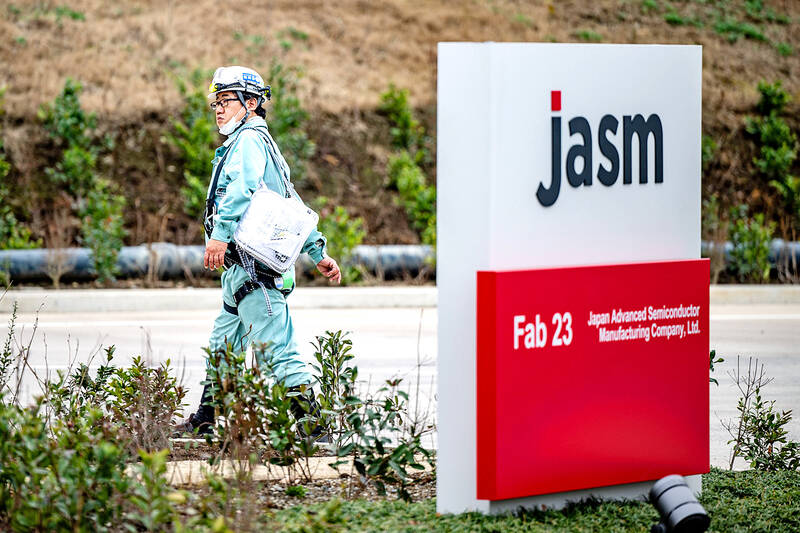Taiwan Semiconductor Manufacturing Co (TSMC, 台積電) yesterday obtained the government’s approval to inject an additional US$10.26 billion to finance the construction of its second fab in Kumamoto, Japan, and a second fab in Arizona, using advanced process technologies.
The Department of Investment Review approved TSMC’s investment applications on the basis that Taiwan remains a major technology and manufacturing hub for the chipmaker, which makes its most advanced chips at home, the company operates its research-and-development center here and the majority of its capacity remains in Taiwan.
The latest capital injections — US$5.26 billion for its Japanese venture Japan Advanced Semiconductor Manufacturing Inc and US$5 billion for TSMC Arizona Corp — would help the chipmaker deepen its partnerships with local supply chains and recruitment of skillful talent, the department said in a statement.

Photo: AFP
That would help safeguard the nation’s semiconductor industry’s competitiveness in the long term, the statement said.
TSMC’s second Arizona fab is to upgrade its process technology to 2 nanometers to support customers’ strong demand for artificial intelligence (AI) in addition to 3-nanometer technology, the world’s biggest contract chipmaker told investors in April.
The new Arizona fab is to enter volume production in 2028, about three years after the first Arizona fab ramps up production in the first half of next year, which was pushed back from an earlier schedule of late this year due to a lack of sufficient technicians and skilled workers.
The second Kumamoto fab is designed to produce chips from 6-nanometer to 40-nanometers used in automotive, industrial and high-performance-computing applications, TSMC said.
The construction is to start in the second half of this year, with volume production targeted by the end of 2027, it said.
The first fab in Kumamoto is to enter volume production of 12-nanometer, 16-nanometer, 22-nanometer and 28-nanometer chips in the fourth quarter of this year as scheduled, the chipmaker said.
Wire and cable maker Walsin Lihwa Corp (華新麗華) yesterday also won approval to invest US$160 million in its fully owned subsidiary in Singapore, Walsin Singapore Pte Ltd.
The department yesterday also gave the go-ahead to electronic components supplier Lite-On Technology Corp’s US$89.38 million plan to acquire equities of Japan’s Cosel Co (光寶科技), a producer of power supplies and noise filters.
The investment would allow Lite-On to indirectly own Cosel’s four Chinese units, the department said.

POWERING UP: PSUs for AI servers made up about 50% of Delta’s total server PSU revenue during the first three quarters of last year, the company said Power supply and electronic components maker Delta Electronics Inc (台達電) reported record-high revenue of NT$161.61 billion (US$5.11 billion) for last quarter and said it remains positive about this quarter. Last quarter’s figure was up 7.6 percent from the previous quarter and 41.51 percent higher than a year earlier, and largely in line with Yuanta Securities Investment Consulting Co’s (元大投顧) forecast of NT$160 billion. Delta’s annual revenue last year rose 31.76 percent year-on-year to NT$554.89 billion, also a record high for the company. Its strong performance reflected continued demand for high-performance power solutions and advanced liquid-cooling products used in artificial intelligence (AI) data centers,

SIZE MATTERS: TSMC started phasing out 8-inch wafer production last year, while Samsung is more aggressively retiring 8-inch capacity, TrendForce said Chipmakers are expected to raise prices of 8-inch wafers by up to 20 percent this year on concern over supply constraints as major contract chipmakers Taiwan Semiconductor Manufacturing Co (TSMC, 台積電) and Samsung Electronics Co gradually retire less advanced wafer capacity, TrendForce Corp (集邦科技) said yesterday. It is the first significant across-the-board price hike since a global semiconductor correction in 2023, the Taipei-based market researcher said in a report. Global 8-inch wafer capacity slid 0.3 percent year-on-year last year, although 8-inch wafer prices still hovered at relatively stable levels throughout the year, TrendForce said. The downward trend is expected to continue this year,

A proposed billionaires’ tax in California has ignited a political uproar in Silicon Valley, with tech titans threatening to leave the state while California Governor Gavin Newsom of the Democratic Party maneuvers to defeat a levy that he fears would lead to an exodus of wealth. A technology mecca, California has more billionaires than any other US state — a few hundred, by some estimates. About half its personal income tax revenue, a financial backbone in the nearly US$350 billion budget, comes from the top 1 percent of earners. A large healthcare union is attempting to place a proposal before

Vincent Wei led fellow Singaporean farmers around an empty Malaysian plot, laying out plans for a greenhouse and rows of leafy vegetables. What he pitched was not just space for crops, but a lifeline for growers struggling to make ends meet in a city-state with high prices and little vacant land. The future agriculture hub is part of a joint special economic zone launched last year by the two neighbors, expected to cost US$123 million and produce 10,000 tonnes of fresh produce annually. It is attracting Singaporean farmers with promises of cheaper land, labor and energy just over the border.